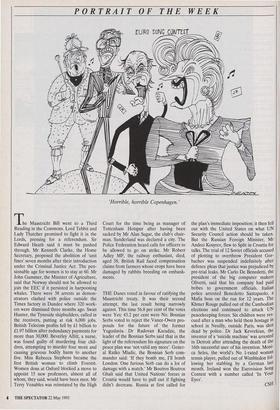PORTRAIT OF THE WEEK
`Horrible, horrible Copenhagen.'
The Maastricht Bill went to a Third Reading in the Commons. Lord Tebbit and Lady Thatcher promised to fight it in the Lords, pressing for a referendum. Sir Edward Heath said it must be pushed through. Mr Kenneth Clarke, the Home Secretary, proposed the abolition of 'unit fines' seven months after their introduction under the Criminal Justice Act. The pen- sionable age for women is to stay at 60. Mr John Gummer, the Minister of Agriculture, said that Norway should not be allowed to join the EEC if it persisted in harpooning whales. There were 38 arrests as demon- strators clashed with police outside the Timex factory in Dundee where 320 work- ers were dismissed three months ago. Swan Hunter, the Tyneside shipbuilders, called in the receivers, putting at risk 6,000 jobs. British Telecom profits fell by £1 billion to £1.97 billion after redundancy payments for more than 30,000. Beverley Allitt, a nurse, was found guilty of murdering four chil- dren, attempting to murder four more and causing grievous bodily harm to another five. Miss Rebecca Stephens became the first British woman to climb Everest. Women dons at Oxford blocked a move to appoint 15 new professors, almost all of whom, they said, would have been men. Mr Terry Venables was reinstated by the High
Court for the time being as manager of Tottenham Hotspur after having been sacked by Mr Alan Sugar, the club's chair- man. Sunderland was declared a city. The Police Federation heard calls for officers to be allowed to go on strike. Mr Robert Adley MP, the railway enthusiast, died, aged 58. British Rail faced compensation claims from farmers whose crops have been damaged by rabbits breeding on embank- ments.
THE Danes voted in favour of ratifying the Maastricht treaty. It was their second attempt, the last result being narrowly against. This time 56.8 per cent of the votes were Yes; 43.2 per cent were No. Bosnian Serbs voted to reject the Vance-Owen pro- posals for the future of the former Yugoslavia. Dr Radovan Karadzic, the leader of the Bosnian Serbs said that in the light of the referendum his signature on the peace plan was 'not valid any more'. Gener- al Ratko Mladic, the Bosnian Serb com- mander said: 'If they bomb me, I'll bomb London. One furious Serb can do a lot of damage with a match.' Mr Boutros Boutros Ghali said that United Nations' forces in Croatia would have to pull out if fighting didn't decrease. Russia at first called for
the plan's immediate imposition; it then fell out with the United States on what UN Security Council action should be taken. But the Russian Foreign Minister, Mr Andrei Kosyrev, flew to Split in Croatia for talks. The trial of 12 Soviet officials accused of plotting to overthrow President Gor- bachev was suspended indefinitely after defence pleas that justice was prejudiced by pre-trial leaks. Mr Carlo De Benedetti, the president of the big computer makers Olivetti, said that his company had paid bribes to government officials. Italian police arrested Benedetto Santapaolo, a Mafia boss on the run for 12 years. The Khmer Rouge pulled out of the Cambodian elections and continued to attack UN peacekeeping forces. Six children were res- cued after a man who held them hostage in school in Neuilly, outside Paris, was shot dead by police. Dr Jack Kevorkian, the inventor of a 'suicide machine' was arrested in Detroit after attending the death of the 16th successful user of his invention. mom- ca Seles, the world's No 1-rated woman tennis player, pulled out of Wimbledon fol- lowing her stabbing by a German last month. Ireland won the Eurovision Song Contest with a number called 'In your Eyes'.
CSH


















































 Previous page
Previous page